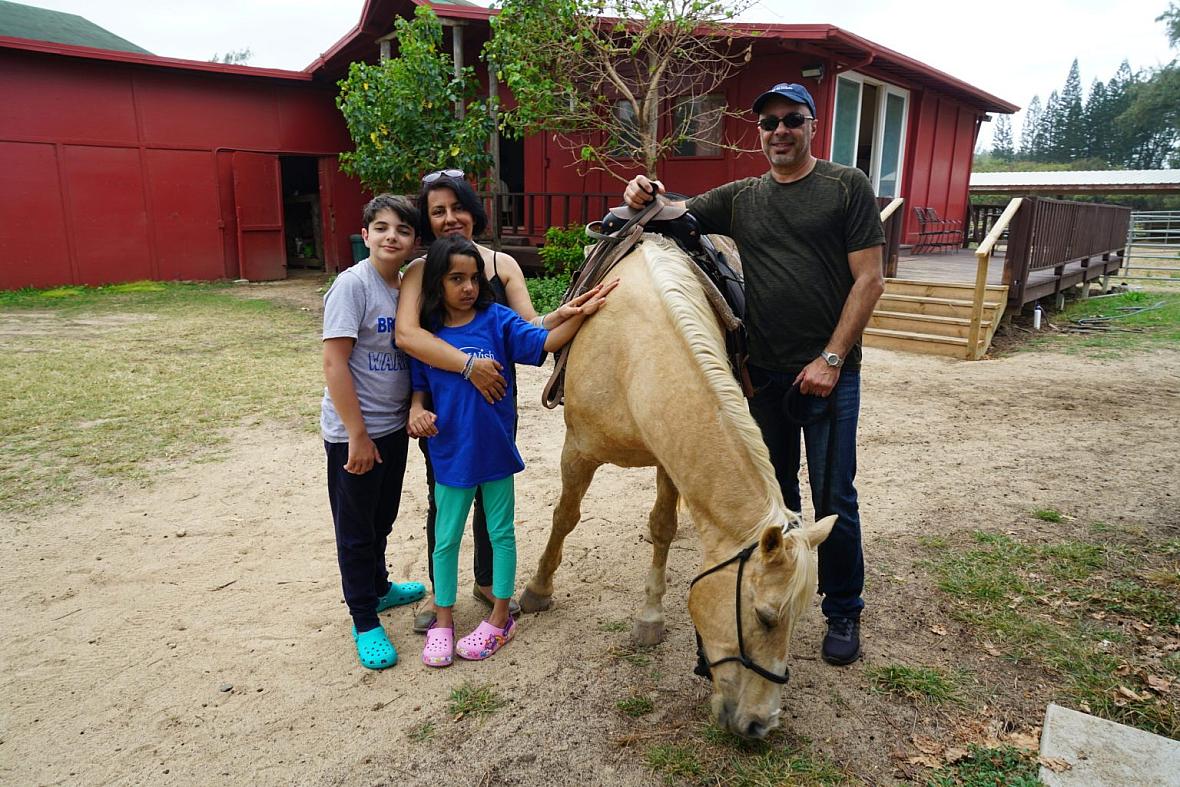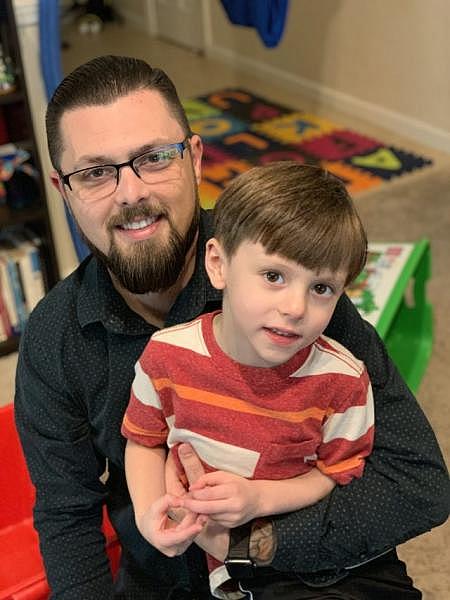Pandemic Pushes Parents of Kids With Special Needs to Breaking Point
This story is produced as part of a larger project by Claudia Boyd-Barrett, with the support of the Center for Health Journalism's Fund for Journalism on Child Well-Being.
Her other stories include:
Amid pandemic, young kids with special needs missing out on services
For Survivors of Violence and Their Kids, a Push to Prioritize Housing
California’s Home Visiting Program Aims to Help the Next Generation Rise from Inequality
Parents Caring for Children with Disabilities Have Some Advice

Lilian Ansari of Oakland with her husband Saied, daughter Atrina, 11, and son Ardalon, 15, on vacation before the pandemic. Life has become very stressful for the Ansaris since stay-at-home orders began and the children, who both have special needs, lost the support of 16 therapists, tutors and other professionals.
Photos courtesy of the Ansari family.
Lilian Ansari used to look forward to the moment each day when her daughter Atrina, 11, and son Ardalon, 15, got on the bus to school.
“I would literally collapse on the kitchen floor and say, ‘Thank you, Oakland School District, for taking my kids,'” said Ansari of Oakland, Calif., whose children have autism and special health care needs.
Then her kids’ school shut down.
Since then, the family has struggled as the support they rely on has been stripped away due to the COVID-19 pandemic. Like thousands of parents across California and beyond who are caring for children with physical, behavioral and developmental conditions, the Ansaris relied on a small army of teachers, therapists, nurses and other caregivers to get through the week.
Now, those vital support structures have crumbled. Parents like the Ansaris are feeling isolated, stressed and overwhelmed at a time when they and their kids need more support than ever to deal with the loss of routine, heightened anxiety and other challenges created by the pandemic.
“All the unstructured time” has led to increased behavioral difficulties for her children, which strains the mental health of Ansari and her husband, she said, speaking from inside a closet where she now goes to take uninterrupted phone calls.
“The stress level,” she said, “is through the roof.”
‘You can feel the panic’
In addition to schools closing, many clinics, in-home therapy programs and after-school activities for children with special needs have shut down. While schools and many service providers have moved online, parents frequently struggle to get their kids to understand and engage in virtual activities, and may not have the time or ability to provide the kind of sensory, hands-on interventions their kids previously received from professionals.
Some families have also lost the help of home nurses and extended family, either because those caregivers are concerned about spreading the virus, or because parents don’t want to risk exposing their children to COVID-19, especially because some of them have compromised immune systems.
Atrina and Ardalon Ansari went from seeing 16 different teachers, tutors, therapists and caregivers each week before the pandemic to only their parents. All of a sudden there was no school, no visit three days a week from Atrina’s applied behavioral analysis therapist, no horseback riding or dance lessons, and no nurse from the local regional center coming to help care for the children so Lilian Ansari and her husband could rest.
Lilian Ansari, shown here on vacation with her family pre-pandemic, feels at times that managing the needs of her children without the usual support feels “pretty unbearable.”
Atrina has a genetic condition called tuberous sclerosis, which requires taking immune suppressant drugs to stop tumors from growing throughout her body. She also has autism, epilepsy and behavior difficulties. Ardalon has autism, anxiety and a sleep disorder.
Lilian Ansari can no longer work because she is taking care of her children full time. Atrina has lost the socialization and reading skills she’d developed at school, and can’t follow the directions provided by her teachers online. She doesn’t understand why she can’t go to school or go out. The family is struggling with outbursts from both children, Ansari said.
At times, managing the needs of her children without the usual support feels “pretty unbearable,” she said.
Juno Duenas, who runs the organization Support for Families of Children with Disabilities in San Francisco, said she and her staff are hearing similar stories from the thousands of parents her organization works with.
There’s the mother who started experiencing face paralysis because she was so overwhelmed caring for her child with autism, without the support of school or aftercare. The parent who had to stop his child with developmental disabilities from trying to jump out of a window when he saw his teacher on the computer and couldn’t make sense of it. The families that have had neighbors call the police because their children act out in frustration about not being able to go outside. Many parents live in fear of having to take their children who are medically fragile to the hospital and risk COVID-19 exposure. Some are also dealing with job loss, food insecurity and financial strain, she said.
“You can feel the panic that people are having. What was hard before is just that much more difficult,” said Duenas. “The families now are home with their kids 24/7. They get no break. Kids’ behavior is exacerbated. Kids are feeling like they’ve done something wrong and they’re being punished.”
These challenges add to the pressure parents of children with special needs and medically fragile conditions already faced. Data compiled by Kidsdata shows that almost a third of parents of children with special health care needs reported feeling parenting stress before the pandemic, more than double the rate reported by parents whose children do not have special needs. The intensive demands of caregiving, the challenges of navigating the complex special education and health care systems, and the social stigma of having a child with disabilities all contribute to this tension, Duenas said.
Risking Exposure for Help
Nick Lutton and his 7-year-old son, Mason, of Fresno. Mason has autism and has struggled to adapt to the loss of in-person schooling and therapy during the pandemic. His behavioral outbursts have put strain on the family. Photo courtesy of the Lutton family.
Nick Lutton of Fresno, Calif. said his 7-year-old son, Mason, who has autism, has been struggling since shelter-in-place orders shut down his school. Mason used to have two aides help him stay focused in the classroom. Without them, Mason can’t concentrate for more than three minutes online.
Mason has also stopped going to therapy because the Luttons don’t want to risk exposing him to COVID-19. Mason can’t talk, so if he gets sick he can’t tell his parents, Lutton explained. The company providing the therapy doesn’t offer telehealth.
Lutton worries about his son, who is now frequently kicking, screaming, biting and hitting his head against the wall.
“It’s emotionally draining and physically draining,” he said. “You feel defeated. It’s a constant state of anxiety.”
For Karla Garcia of San Francisco, the pandemic has meant becoming both mom and therapist to her 3-year-old daughter, Brianna. The toddler has a rare neurological disorder that affects her ability to walk, talk and eat. She used to get in-person physical, occupational and speech therapy at preschool. Now, Garcia is doing those therapies herself with the help of pre-recorded videos. She’s also had to take Brianna to the hospital twice during the pandemic because of problems with her feeding tube.
The situation felt overwhelming for Garcia. To help cope, she recently started an exercise routine, obtained an in-home nurse through the regional center, and joined an online support group for parents.
“That’s helped me find myself,” she said. “I’m a little less stressed.”
Other parents have also decided to risk possible exposure to COVID-19 and resume some kind of in-home nursing care or therapy. Lutton said he was recently able to secure a personal assistant through his local regional center to come to the house and help Mason do his applied-behavioral-analysis therapy online. Ansari and her husband obtained a behaviorist to help care for Atrina part-time, but had to stop again after the specialist reportedly came into contact with someone with COVID-19.
Christina Share, information and resource manager with Support for Families of Children with Disabilities, said schools need to make sure students in special education receive the full range of supports they received under their individualized plans before the pandemic. Also, families of children with intensive needs should be able to receive in-home support from paraprofessionals who can help them with their Zoom meetings and online learning, she said.
Lutton said it’s also important for parents to reach out for support, both to dedicated agencies such as the regional center and family resource centers, and to online parent support groups, friends and family members. Otherwise they risk becoming isolated, he said.
Still, many parents struggled to think of solutions, given the risks posed by the virus and the fact that California schools are expected to continue with distance learning in the fall. Many therapies will also likely continue online.
Lilian Ansari said the thought of several more months with no effective school and no therapists for her kids is daunting. Even if the school district does reopen, she said she’d be too afraid to send her children if COVID-19 remains a risk.
“I feel like special needs families are really suffering,” she said. “How are we going to survive? Even if the schools reopen, I can’t send my daughter because she’s immune compromised. I can’t send my son because … he’ll bring whatever he’s exposed to back home. We’re stuck.”
This story was produced in partnership with the
[This story was originally published on California Health Report, as well as East Bay Express, Disability Scoop, The Mighty, and MSN.]

